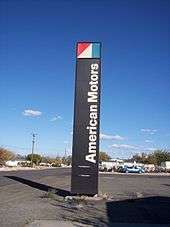Richard E. Cross
| Richard E. Cross | |
|---|---|
 Richard E. Cross at AMC in the 1960s | |
| Born |
1910 Madison, Wisconsin, USA |
| Died |
31 August 1996 Rochester Hills, Michigan, USA |
| Alma mater |
|
| Occupation | Lawyer and business executive in the automotive industry |
| Years active | 1938–1987 |
| Employer | American Motors Corporation |
| Awards | Steering Wheel Award, the Automobile Club of Michigan[1] |
Richard Eugene Cross was an American business executive in the automotive industry, a lawyer, and civic leader.
Civic leadership
Cross participated in many civic activities and provided leadership in several organizations that included citizens groups on housing, schools, and police-community relations. He marched with Martin Luther King, Jr. after the 1967 Detroit riot.[2] He headed the Detroit Commission on Community Relations as the mayor's appointee from 1958 to 1962.[3][4]
He was one of the first commissioners of the Michigan Department of Civil Rights, but in 1965, Cross declined a reappointment request by Governor George W. Romney because of the pressing business conditions at American Motors Corporation (AMC).[5] For twenty years, Cross was head of the executive committee for the United Negro College Fund in Michigan.[6]
Cross was a founder and chairman of the Hundred Club of Detroit, whose purpose is to help provide for the widows and dependents of policemen and firemen who lose their lives in the line of duty.[6]
Cross was elected in 1959 as the only United States representative to the Pan American Games Committee, on which he served until 1963.[7] In 1960, he also served as member at large on the United States Olympic Committee.[2]
Career at AMC
Cross was a "quiet, analytical attorney" who served as legal counsel for American Motors Corporation (AMC).[8] He drew up the 1954 merger papers that created the new company from Nash-Kelvinator and Hudson Motor Car Company.[8] Cross became a director of the company in 1954, and in 1959, a member of the policy committee.[8]
He was one of a duumvirate succeeding George W. Romney, who at the time was technically on leave of absence.[9] In 1962, at age 52, Cross was elected chairman of the board of directors as well as the chief executive officer, while Roy Abernethy was named president of AMC.[8]
This was a turbulent time in AMC's strategy development. While the rest of the industry had record earnings, AMC's profits and return on sales dropped (from 7% of its sales in 1959, to an estimated 3.5% return for 1962).[9] However, in September 1962, AMC paid off an US$80 million loan and became the only U.S. automaker free of long-term debt.[9] Management could go after new markets, but the company had developed a resistance to extensive restyling.
Cross supported the change away from Romney's legacy of the "economy-car" image and their "boxy" styling.[10] This involved the automaker making major design, styling, and marketing changes, as well as the addition of new convertibles and sporty models that were promoted by Abernethy.[11]
In June 1966, Cross was forced to step down from the CEO post and was replaced by Robert B. Evans.[12] Cross became chairman of AMC's executive committee and could devote more time to his practice of law in Detroit, Michigan.[12]
"Cross was an urbane, hardheaded lawyer, as well as the chief executive officer at AMC making long-term decisions"[9]
He died in his home in Rochester Hills, Michigan on 31 August 1996.[2]
References
- ↑ "Contributions to Safety". The News-Palladium. Benton Harbor, Michigan. 20 May 1966. p. 11. Retrieved 17 March 2016.
- 1 2 3 Freundenheim, Milt (8 September 1996). "Richard E. Cross, 85, Executive and Civic Leader in Michigan". The New York Times. Retrieved 17 March 2016.
- ↑ "Detroit: A Guide to the Resources in the Bentley Historical Library - Cross, Richard E.". University of Michigan. Retrieved 17 March 2016.
- ↑ Stolberg, Mary M. (2002). Bridging the River of Hatred: The Pioneering Efforts of Detroit Police Commissioner George Edwards, 1962-1963. Wayne State University Press. pp. 187, 243, 262. ISBN 9780814325735. Retrieved 17 March 2016.
- ↑ "Michigan Civil Rights Commission: 40th Anniversary" (PDF). michigan.gov/mdcr. 2003. p. 2. Retrieved 17 March 2016.
- 1 2 "Richard Eugene Cross". Associated Press. 3 September 1996. Retrieved 17 March 2016.
- ↑ "U.S. Weakened for Pan-American Games". Reading Eagle. 2 August 1959. Retrieved 17 March 2016.
- 1 2 3 4 "Autos: Two for American Motors". Time. 23 February 1962. Retrieved 17 March 2016.
- 1 2 3 4 "Life Without Father". Time. 5 October 1962. Retrieved 17 March 2016.
- ↑ Conde, John A. (June 1988). "1965-67 AMC Marlin". Collectible Automobile Magazine. 5 (1).
- ↑ Auto Editors Consumer Guide (26 October 2007). "Introduction to the 1965-1967 AMC Marlin". HowStuffWorks.com. Retrieved 17 March 2016.
- 1 2 "American Motors' New Gospel". Time. 17 June 1966. Retrieved 17 March 2016.
